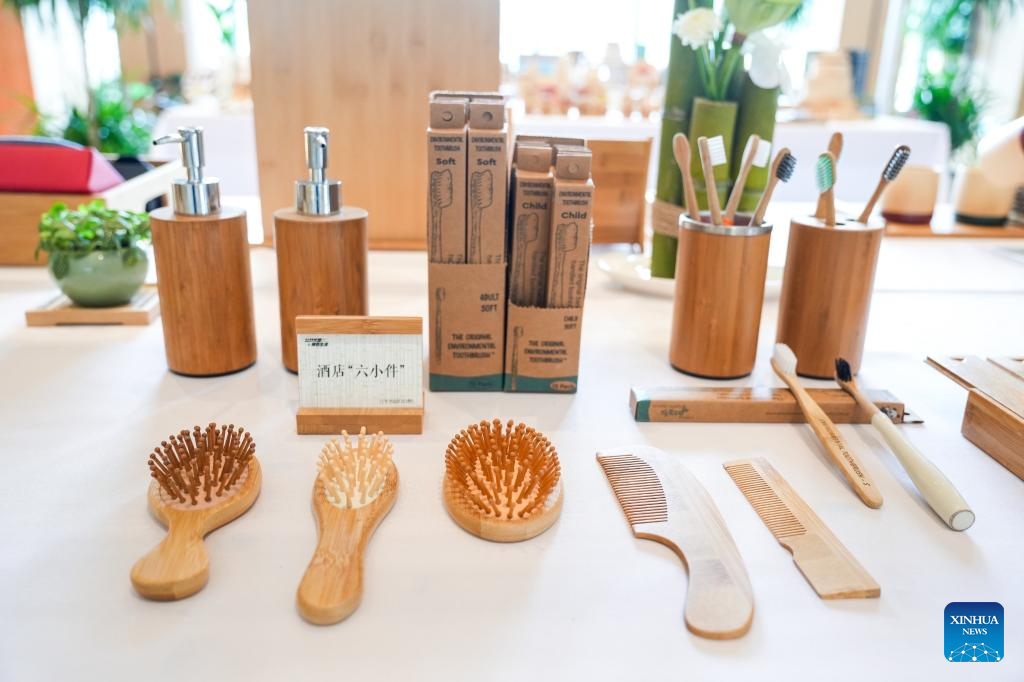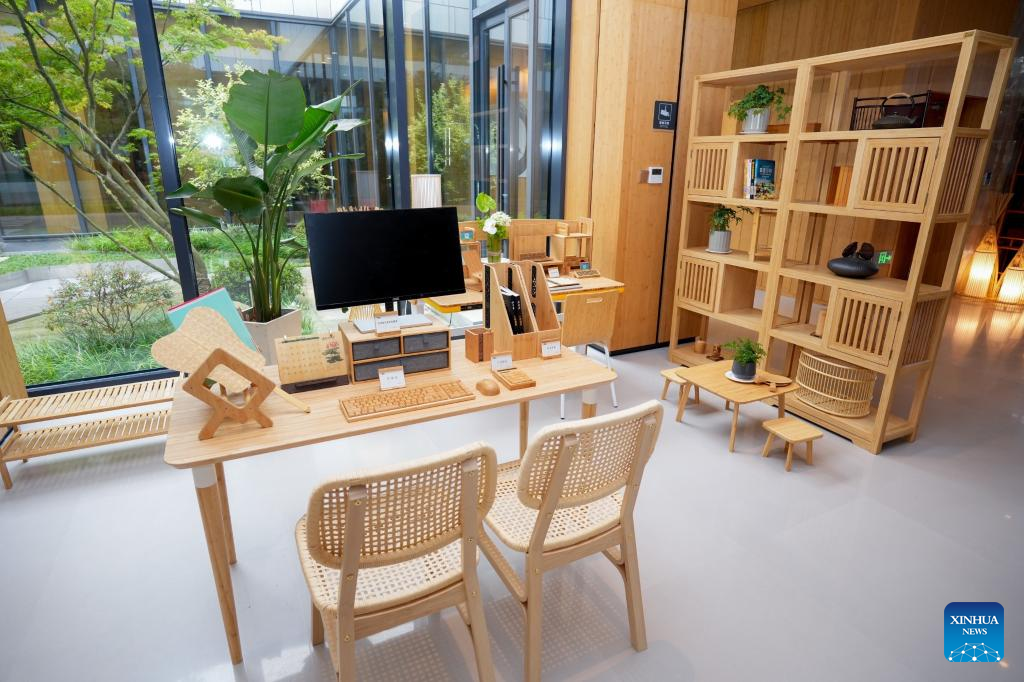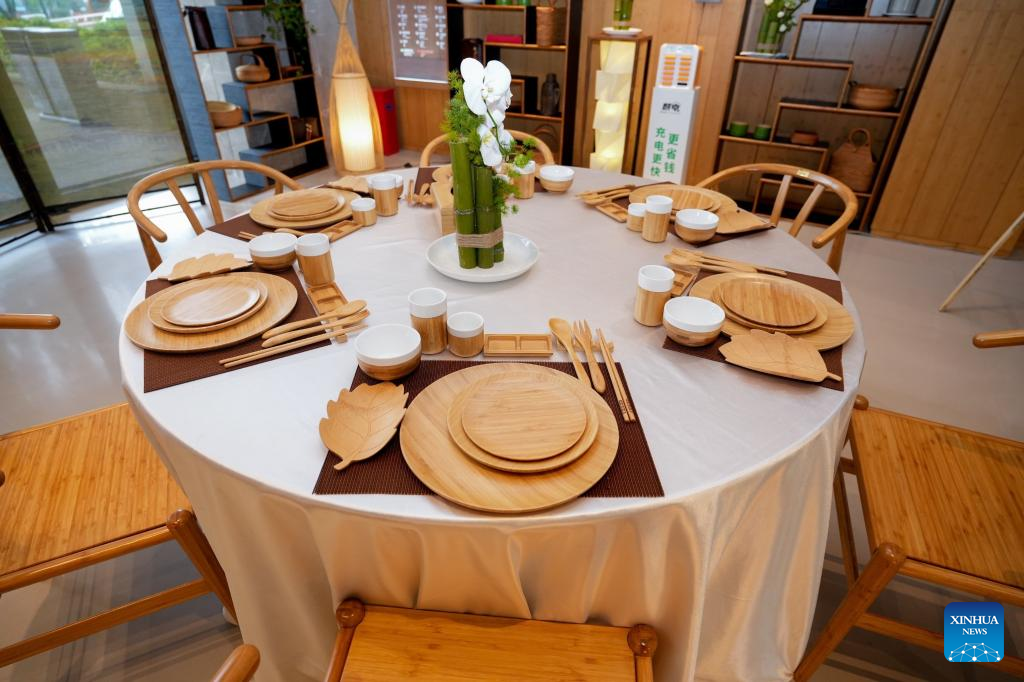
This photo taken on Aug. 16, 2023 shows combs and other daily necessities made from bamboo at a homestay in Anji County of Huzhou City, east China's Zhejiang Province. (Xinhua/Zhu Han)
HANGZHOU, June 5 (Xinhua) -- Bamboo tableware, bamboo toothbrushes, bamboo fiber towels... A resident surnamed Wang from Hangzhou, staying at a homestay in Baofu Township, Anji County of east China's Zhejiang Province, was delighted to find that products and toiletries used daily were crafted from bamboo.
"Anji, renowned as China's 'bamboo county,' offers these products that are not only locally-made but also eco-friendly," Wang said.
Anji County, with its vast expanse of over 1 million mu (about 66,667 hectares) of bamboo forests, has been a pioneer in integrating bamboo into various sectors such as construction, decoration, furniture, packaging, textiles, and disposable products across China. The county has been at the forefront of promoting bamboo as an alternative to plastic in recent years.
"Bamboo, being one of the fastest-growing plants with exceptional carbon sequestration capabilities, is an ideal material for sustainable and green practices. It is estimated that utilizing 100 million tonnes of bamboo to replace PVC products could potentially reduce carbon dioxide emissions by approximately 600 million tonnes," explained Chen Jie, director of the Bamboo Industry Development Center under the county's forestry bureau, highlighting the significance of the "bamboo instead of plastic" initiative.
A report from the Organization for Economic Cooperation and Development in 2022 projected that by 2060, the annual global production of plastic products could soar to around 1.2 billion tonnes, nearly tripling the current levels. The study warns that if recycling rates do not improve, the volume of plastic waste could also nearly triple by then.
Experts advocate for "bamboo instead of plastic" as an effective strategy to mitigate plastic usage and pollution at its source. Data indicates that in 2021, China's bamboo forest area stood at some 7.56 million square hectares, representing 3.31 percent of the total forest area. With over 10,000 bamboo processing enterprises, China's bamboo industry output value has seen a remarkable increase from 82 billion yuan (about 11.54 billion U.S. dollars) in 2010 to 415.3 billion yuan in 2022, boasting an average annual growth rate of over 30 percent.
In November 2023, the Chinese government, in collaboration with the International Bamboo and Rattan Organization, launched the Global Action Plan for Bamboo as a Substitute for Plastic (2023-2030). This initiative calls upon international organizations, government departments, and research and educational institutions worldwide to collectively reduce plastic pollution.
To further control plastic pollution across the entire chain, in December 2023, Chinese authorities formulated a three-year action plan aimed at accelerating the development of "bamboo instead of plastic." The plan sets forth ambitious goals: by 2025, to establish an industrial system and to make more detailed arrangements for enhancing the quality, variety, scale, and overall benefits of bamboo products.
Anji County has set an example by increasing its bamboo tableware to over 6,000 sets, covering nearly 300 hotels with a 100-percent coverage rate, resulting in a cumulative reduction of over 3.5 million sets of disposable plastic consumables.
Jiangxi Province has set a target for its bamboo industry to reach a comprehensive output value of 100 billion yuan by 2025, with the bamboo forest area stabilized at 16 million mu.
Fujian Province aims to stabilize its bamboo forest area at 18.19 million mu by 2025, construct 5,000 km of bamboo mountain roads, and achieve a total output value of 120 billion yuan for the bamboo industry, with an average annual growth rate of over 10 percent.
"'Bamboo instead of plastic' is an emerging industry. Despite its current small industry scale, low output, high costs, and relatively outdated technology and equipment, the true potential of bamboo as a substitute for plastic lies in further promoting its high added value with technological advancements," said Wang Yixiang, professor of Zhejiang Agriculture and Forestry University.
Wang believes that advancing the initiative will become an effective way to control plastic pollution in China and is expected to offer a solution for global plastic pollution management. ■

This photo taken on Aug. 16, 2023 shows furniture and office supplies made from bamboo at a homestay in Anji County of Huzhou City, east China's Zhejiang Province. (Xinhua/Zhu Han)

This photo taken on Aug. 16, 2023 shows bamboo tableware at a homestay in Anji County of Huzhou City, east China's Zhejiang Province. (Xinhua/Zhu Han)



